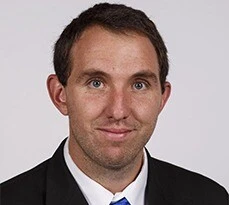As more and more is demanded of leaders in a complex and unpredictable world, what should you bear in mind as you develop your own leadership style?
We asked a member of faculty, an alumnus, an MBA candidate and a mentor from Cambridge Judge Business School for their thoughts.
Cambridge MBA Faculty – Dr Thomas Roulet

Dr Thomas Roulet is University Senior Lecturer in Organisation Theory with research interests which include economic sociology, organisation theory and social evaluations.
How do leaders deal with uncertainty in an increasingly uncertain and fast-moving world?
Leaders have to accept they are not omniscient – like anybody else, they are boundedly rational. They cannot anticipate the future, especially in the current context, and they cannot be aware of all the macro and industry-level trends that might affect their organisations. Yet, they can build a system of awareness by surrounding themselves with a diversity of opinion to help and support decision making. Leaders will have to take risky decisions, especially as market conditions move so fast, but they also have to be prepared to take responsibility for mistakes and carefully evaluate the costs of those mistakes. Ensuring that their followers are supportive of a course of action will enable them to share responsibility.
What responsibility do leaders have to drive forward an ethical business climate?
Leaders often act as role models. Whatever they do, other organisational members are likely to mimic because the leader sets the tone. For example, if a leader behaves unethically, unethical conduct may appear as the norm and be seen as encouraged. Leaders have to be morally flawless if this is the sort of organisational culture they want to build. They also need to be engaged in encouraging pro-social behaviour (recognising extra efforts by the organisational members, and appreciating those efforts on a personal basis) and discouraging anti-social and unethical ones (personally taking a stance, but also creating organisational systems to address those issues).
What skill-set do leaders need to develop to take companies to the next level globally?
In the current context, despite deglobalisation and rising international tensions, leaders more than ever need to have global experience. They need to know the specificities of different cultural contexts, both as potential bases for their organisation, but as sources of talents as well. This is about cultural sensitivity, but also knowing the strength of different cultures and appreciating them. Leaders also need to counteract the current dominant political discourse by promoting a global and inclusive world.
Cambridge MBA alumnus – Richard Evans

Richard (MBA 2014) is a natural resource specialist with operational, governance, and market experience gained at global multinationals.
How do leaders lead through uncertainty in a fast-changing and unpredictable world?
First and foremost, leaders should be seeking to chart the organisation toward profitability and sustainability. External factors are often not within the control of leadership, who must be able to take a long-term view, and not be unduly pressured to generate returns on a short-term horizon. So, the focus should be on optimising the value levers within their control – generally these include operational performance, cost performance, sales optimisation, and attracting talent that will strengthen the team and develop new or improved capabilities. Leaders who can temper the expectations of the market and stakeholders, in periods of short-term volatility, need to have developed a credible and considered long term strategy to fall back on.
People are the key component of achieving success – a leader needs to be sufficiently confident to surround themselves with people smarter than them, and to create an environment to allow the talent to express themselves. As tasks become increasingly ambiguous (or the vision is not compelling), emotional intelligence/capability becomes more important to identify which resources require assistance, and how best to keep a team engaged and productive.
What responsibility do leaders have today to drive an ethical business climate?
A lot depends on where the business is – in a developed or developing economy as priorities will differ with context. There is also the personal ethical compass of the leader to consider – to quote Keith Goodall, “My world is not your world”. However, as technology has improved, business is evolving toward an expectation of increased transparency, and therefore companies are more prone to scrutiny. Customers / consumers are increasingly demanding an ethical supply chain (fewer plastics, less exploitative, ‘fairer’). The current pressure on oil and gas / coal companies will translate into other industries deemed ‘non-green’ – automotive, mining, fishing. It will be necessary to consider how these industries evolve, as they are pivotal in the global economy (impact on workforces and their dependants), but these are elements that the leaders of the business should already be mapping out.
What skill set do leaders need to develop to take companies to the next level globally?
They require self-awareness, adaptability, an ability to both dive into detail and take a broad view, and the technical skill set to build credibility. Interpersonal skills to develop long-term, meaningful relationships, as well as cultural appreciation and sensitivity are important in an increasingly connected world. The most compelling leaders tend to be storytellers who can communicate a vision/strategy and bring people along with them.
MBA candidate – Dr Slaven Stekovic

Most recently Slaven (MBA 2018) was Team Lead and Senior Innovation Consultant at Science Park Graz, the biggest high-tech startup incubator in Austria. Post-MBA he is considering options in entre/intrapreneurial space and VC funds.
How do leaders lead through uncertainty in a fast-changing and unpredictable world?
Leadership represents the responsibility and the courage to make decisions within a set of circumstances you don’t always control. Particularly in times of uncertainty, it becomes crucial for the leader to collect all available information to make the best decision within timeframes and organisational goals. A good leader empowers and motivates their followers and partners to be pro-active intelligence agents. Understanding the mechanisms and methodology of data collection and analysis becomes crucial in assessing the situation and reducing the number of assumptions that decisions are based upon.
What responsibility do leaders have to drive an ethical business climate?
This should come from a leader’s moral and ethical standards and less from externalities like legal and political landscapes. Hence, a leader’s responsibility in this sense still remains to motivate their followers to act according to ethical standards. The growing demand for increased transparency and higher visibility of organisational responsibility reduces the chances for ethically irresponsible leaders to stay in the shadows. More open business cultures and increased social pressure mean people are less ignorant about and tolerant of misalignment between general social ethical standards and organisational behaviours. Hence there is an increased pressure on leaders to communicate, monitor and fix behaviours that might lead to unethical business climates.
What skill set do leaders need to develop to take companies to the next level globally?
One of the big challenges for business is decentralisation of processes through remote work and globalisation, and increased pace of technological development which drives cultural complexity for many organisations. These drivers often lead to an increased demand for dynamic strategies with high dependability on sensing the internal and external changes. Understanding the underlying mechanisms of such changes can introduce better predictability into company processes and the leader’s role is to establish an environment where such ‘intelligent’ behaviour is an inherent component of business culture. Hence, leaders should motivate their followers to understand and become part of the business culture, and to identify possible improvements that would benefit a company’s vision and goals in a dynamic environment.
And the final word goes to CJBS Careers Consultant and Occupational Psychologist, David Cook

David advises leaders globally in fields such as tech-science, healthcare, engineering and new ventures.
Leaders don’t lead alone, and you will inevitably, therefore, find yourself on management teams and boards. But in my experience, despite the seismic changes businesses have had to grapple with in recent decades, with the advent of the digital revolution and globalisation, leadership teams in many cases haven’t moved with the times; tending to be insufficiently in touch with their workforce and lacking in diversity, both of which are very dangerous for any business. Boards and Executive teams are still too male and pale and do not do enough to bring diverse voices in from all parts of the business to grapple with the complexity, disruption, and requisite organisational agility now needed for sustained success. There is still a lot of ego and hubris with leaders failing to commit to the hard – but ultimately rewarding – on-going work of self-awareness and to understand the humility that needs to go with leadership – admitting you’re not an expert in everything and you haven’t got all the answers.
To be a successful leader, you will need to continually work on your self-awareness, especially understanding and managing your own behavioural tendencies, if others in the organisation, who will mimic yours – are to mirror productive habits. You will need to practice humility in learning from others and influencing your executive and board to engage deeper with the business at all levels, really understand your employees and what motivates them to bring their best to work, and bring their voices into the everyday practice of management.


